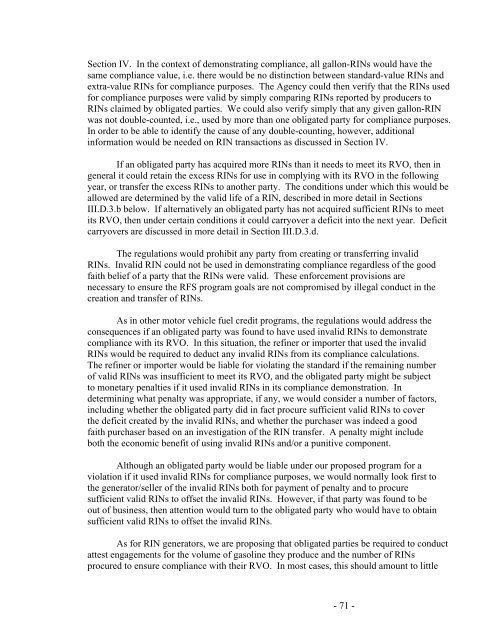Regulation of Fuels and Fuel Additives: Renewable Fuel Standard ...
Regulation of Fuels and Fuel Additives: Renewable Fuel Standard ...
Regulation of Fuels and Fuel Additives: Renewable Fuel Standard ...
You also want an ePaper? Increase the reach of your titles
YUMPU automatically turns print PDFs into web optimized ePapers that Google loves.
Section IV. In the context <strong>of</strong> demonstrating compliance, all gallon-RINs would have the<br />
same compliance value, i.e. there would be no distinction between st<strong>and</strong>ard-value RINs <strong>and</strong><br />
extra-value RINs for compliance purposes. The Agency could then verify that the RINs used<br />
for compliance purposes were valid by simply comparing RINs reported by producers to<br />
RINs claimed by obligated parties. We could also verify simply that any given gallon-RIN<br />
was not double-counted, i.e., used by more than one obligated party for compliance purposes.<br />
In order to be able to identify the cause <strong>of</strong> any double-counting, however, additional<br />
information would be needed on RIN transactions as discussed in Section IV.<br />
If an obligated party has acquired more RINs than it needs to meet its RVO, then in<br />
general it could retain the excess RINs for use in complying with its RVO in the following<br />
year, or transfer the excess RINs to another party. The conditions under which this would be<br />
allowed are determined by the valid life <strong>of</strong> a RIN, described in more detail in Sections<br />
III.D.3.b below. If alternatively an obligated party has not acquired sufficient RINs to meet<br />
its RVO, then under certain conditions it could carryover a deficit into the next year. Deficit<br />
carryovers are discussed in more detail in Section III.D.3.d.<br />
The regulations would prohibit any party from creating or transferring invalid<br />
RINs. Invalid RIN could not be used in demonstrating compliance regardless <strong>of</strong> the good<br />
faith belief <strong>of</strong> a party that the RINs were valid. These enforcement provisions are<br />
necessary to ensure the RFS program goals are not compromised by illegal conduct in the<br />
creation <strong>and</strong> transfer <strong>of</strong> RINs.<br />
As in other motor vehicle fuel credit programs, the regulations would address the<br />
consequences if an obligated party was found to have used invalid RINs to demonstrate<br />
compliance with its RVO. In this situation, the refiner or importer that used the invalid<br />
RINs would be required to deduct any invalid RINs from its compliance calculations.<br />
The refiner or importer would be liable for violating the st<strong>and</strong>ard if the remaining number<br />
<strong>of</strong> valid RINs was insufficient to meet its RVO, <strong>and</strong> the obligated party might be subject<br />
to monetary penalties if it used invalid RINs in its compliance demonstration. In<br />
determining what penalty was appropriate, if any, we would consider a number <strong>of</strong> factors,<br />
including whether the obligated party did in fact procure sufficient valid RINs to cover<br />
the deficit created by the invalid RINs, <strong>and</strong> whether the purchaser was indeed a good<br />
faith purchaser based on an investigation <strong>of</strong> the RIN transfer. A penalty might include<br />
both the economic benefit <strong>of</strong> using invalid RINs <strong>and</strong>/or a punitive component.<br />
Although an obligated party would be liable under our proposed program for a<br />
violation if it used invalid RINs for compliance purposes, we would normally look first to<br />
the generator/seller <strong>of</strong> the invalid RINs both for payment <strong>of</strong> penalty <strong>and</strong> to procure<br />
sufficient valid RINs to <strong>of</strong>fset the invalid RINs. However, if that party was found to be<br />
out <strong>of</strong> business, then attention would turn to the obligated party who would have to obtain<br />
sufficient valid RINs to <strong>of</strong>fset the invalid RINs.<br />
As for RIN generators, we are proposing that obligated parties be required to conduct<br />
attest engagements for the volume <strong>of</strong> gasoline they produce <strong>and</strong> the number <strong>of</strong> RINs<br />
procured to ensure compliance with their RVO. In most cases, this should amount to little<br />
- 71 -
















